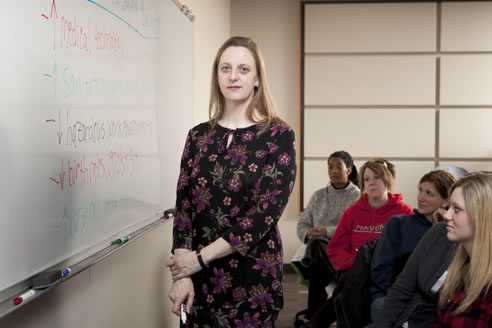Curriculum Overhaul to Infuse Gerontological Content
Nancy Kelley-Gillespie, PhD
Assistant ProfessorFaculty Representative
University of Nebraska at Omaha
School of Social Work
 (Above) Dr. Kelley-Gillespie with social work students at the University of Nebraska at Omaha.
(Above) Dr. Kelley-Gillespie with social work students at the University of Nebraska at Omaha.
“We were undergoing a massive effort to improve our curriculum when we started the Curriculum Development Institute Program,” says Nancy Kelley-Gillespie, PhD, Assistant Professor, University of Nebraska at Omaha (UNO), School of Social Work. “It was a good time to infuse gerontological content.”
In 2009, the UNO School of Social Work was one of three schools selected by the CSWE Gero-Ed Center to receive the Anita Rosen Award for Best Practices in Gerontological Infusion for demonstrating exemplary gerontological curricular changes. The school had participated in the Curriculum Development Institute program from 2004 to 2007. Nancy Kelley-Gillespie, PhD represented the UNO School of Social Work at the CSWE Annual Program Meeting.
To make the changes, the school conducted course audits and syllabi revisions to make sure that course descriptions and course objectives reflected lifespan development, intergenerational connections, and other types of aging content. The social work faculty also made sure there were opportunities for classroom discussions, assignments, guest speakers, field trips, and projects specific to aging. They used the Gero-Ed Center Web site to compile resources, as well as create their own. “We familiarized ourselves with resources in the community and developed lists of guest speakers who were MSWs or related professionals in aging,” says Dr. Kelley-Gillespie.
Dr. Kelley-Gillespie also notes that the school worked hard to create new practicum settings for students at all levels to be exposed to older adults and their families. “Out of about 300 agencies that we work with regularly, 50 offer experiences with older adults,” she says. Twenty-four of these were created with a Hartford Partnership Program in Aging Education grant.
Since January 2008, 57 students have had a practicum experience in an aging-related setting, which is an average of nine per semester. Prior to UNO’s participation in the Hartford programs, this number was just one or two per academic year. “It was a big accomplishment for us to increase both the number of settings and the number of students who had a practicum experience related to aging,” says Dr. Kelley-Gillespie. To sustain these efforts, the school has secured a grant from a local foundation to expand the practicum model to focus on the needs of surrounding rural communities.
The UNO School of Social Work also began working more closely with the gerontology department, which is separate from the School of Social Work. “We make it as easy as possible for social work students with an interest in aging to supplement their social work degree with a certificate or a minor in gerontology,” says Dr. Kelley-Gillespie.
“All graduates from our program now have the basic competencies to understand issues related to aging and effective skills to address the needs of that population.”
